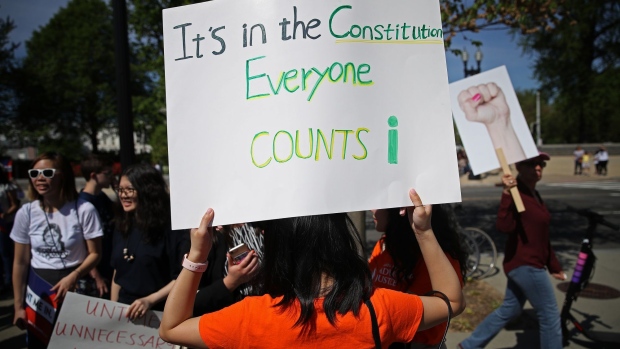Dec 3, 2020
Houses of Worship Shouldn’t Be Treated Like Bars or Gyms
, Bloomberg News

(Bloomberg Opinion) -- Last week, Justice Neil Gorsuch not-so-subtly jabbed at secular liberals by name-checking several “essential” businesses allowed to remain open — liquor stores, bike shops and acupuncturists — even as houses of worship were required to close. “It may be unsafe to go to church,” he wrote. “But it is always fine to pick up another bottle of wine, shop for new bike, or spend the afternoon exploring your distal points and meridians.” His implication was that the law was catering to liberal elites, the kind who ride bikes (guilty as charged) and treat acupuncture as an “exploration.”
In the decision that occasioned this pointed comment, the Supreme Court ruled that religious institutions can’t be subject to stricter Covid-19 restrictions than other organizations. It marks a meaningful doctrinal development in First Amendment jurisprudence. The court’s new majority is moving to give religion “most favored nation” status when compared to other public businesses and institutions.
But more significant than the change in the law is the cultural and ideological divide it signifies. Gorsuch’s jab is a prime example.
The divide can be summed up by the different ways that secular liberals and religiously oriented conservatives react to the core question: Is it wrong to close churches, mosques and synagogues when businesses are allowed to remain open, albeit with restrictions? The two sides respond to this touchstone question radically differently. Each side could benefit from understanding the other’s perspective better.
Start with those who would keep houses of worship closed. To many liberals, it seems obvious that religious buildings should be shut down because people gather together in them for an extended period of time and often sing together, raising the risks of virus transmission. A major study published last month suggests that houses of worship rank with gyms, restaurants and hotels as real-world super-spreader sites.
The same is not true of liquor stores, big-box stores, or indeed bike shops or acupuncturists. In those establishments, employees may remain inside for long hours, but customers come and go. Their interactions are fleeting. They don’t sing.
These are all pragmatic arguments with significant force. They rely on the evidence that infection is more common in religious gatherings and the practical-legal assessment that the government should be allowed to treat such gatherings differently from shopping.
This pragmatic approach is grounded in a secular, scientific worldview that treats religious motives as irrelevant. In this worldview, the symbolism or morality of allowing people to buy alcohol or engage in retail therapy when they cannot worship together is secondary. What matters is “following the science,” as if that doesn’t entail messy judgment calls, too — as in the debate over reopening schools.
To many religious believers, however, the issue is not the calculation of probabilities of infection, but the moral and spiritual meaning of the policies. To them, there is no form of human activity more significant, more nourishing or more transcendently valuable than gathering in prayer. Collective prayer sustains believers of nearly every religious tradition in the world. It is the essence of the free exercise of religion, because it is the essence of connecting to the divine.
Seen through this lens, collective prayer deserves special treatment because of its unique place in the sphere of human practice and experience. There is a hierarchy of values here — and communing with the divine is at the very top.
That is one reason liquor stores have become the main counter-example invoked by religious believers arguing for exemptions. The argument is that by leaving those doors open, the government is acknowledging that lots of people really feel that they need a drink, especially in the midst of a pandemic.
Wait a minute, the believers are saying: Don’t you realize we need to pray together just as urgently as you need a cocktail? Isn’t our spiritual need as great or rather greater than your physiological or psychological one? Shouldn’t it be obvious that the morally praiseworthy act of praying deserves more protection than the morally neutral or morally questionable act of pouring yourself a martini?
The powerful arguments on both sides can sometimes slide into a mild mutual contempt. I certainly know secular liberals who privately consider the believers’ demand to pray even when lives are at stake to be evidence of backwards supernaturalism. And I know religious conservatives who deride the emptiness of secular life and see it at as the explanation for what they experience as discrimination against them.
It’s unfortunate when secular liberals and religious conservatives misunderstand each other and then double down on that misunderstanding with mutual dislike. Both worldviews, secular and religious, deserve respect. There are good arguments on both sides of this question — good scientific arguments on one side, and good spiritual arguments on the other. Neither side has a monopoly on morality. And, lest we forget, we all need to live together when this pandemic is over.
This column does not necessarily reflect the opinion of the editorial board or Bloomberg LP and its owners.
Noah Feldman is a Bloomberg Opinion columnist and host of the podcast “Deep Background.” He is a professor of law at Harvard University and was a clerk to U.S. Supreme Court Justice David Souter. His books include “The Three Lives of James Madison: Genius, Partisan, President.”
©2020 Bloomberg L.P.